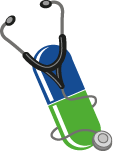Key messages for the general public
Key messages for the general public
English (143.52 KB - PDF)When should I take antibiotics?
Antibiotics are not the solution for infections caused by viruses such as common colds or flu. Antibiotics are effective only against bacterial infections. The correct diagnosis and the decision about whether antibiotics are necessary can only be made by a medical doctor.
Remember: Antibiotics won’t work in the case of cold or flu
- Antibiotics are effective only against bacterial infections – they cannot help you recover from infections caused by viruses such as common colds or flu [1].
- Antibiotics do not prevent viruses from spreading to other persons.
- Taking antibiotics for wrong reasons, such as against colds or flu, has no benefit for you [1, 2].
- Misuse of antibiotics only causes bacteria to become resistant to antibiotic treatments [3, 4, 5]. So when you need antibiotics in the future they may no longer work [6].
- Antibiotics often give you side effects such as diarrhoea [1, 2, 7, 8].
- Always seek your doctor’s advice before taking antibiotics.
How should I take antibiotics?
When the doctor has confirmed that antibiotics are necessary, it is very important to take the antibiotics in a responsible manner.
Remember: Take antibiotics responsibly
- Antibiotic use causes bacteria to become resistant to antibiotic treatments [3, 4, 5], therefore it is important not to take antibiotics for the wrong reasons or incorrectly [1, 2, 9].
- Take antibiotics only when prescribed by a doctor and follow the doctor’s advice on how to take the antibiotics so that they can stay effective also in the future.
- Do not keep leftover antibiotic treatments [10]. If you have received more doses than you were prescribed, ask your pharmacist about how to dispose of the remaining medicines.
Why should I take antibiotics responsibly?
Wrong or incorrect use of antibiotics may cause the bacteria to become resistant against future treatments. This is a health hazard not just for the person having taken the antibiotics inappropriately but also for anyone else who might catch the resistant bacteria afterwards.
Remember: Keeping antibiotics effective is everybody’s responsibility
- Antibiotics are losing their effectiveness at a pace that was unforeseen even five years ago [11]. This is because antibiotic use causes bacteria to become resistant to antibiotic treatments [3–5].
- If we continue to consume antibiotics at the current rate, Europe may face a return to the pre-antibiotic era, where a common bacterial infection such as pneumonia could be a death sentence [12, 13]. So when you do need antibiotics in the future they may no longer work [6].
- Do not use antibiotics for the wrong reasons or incorrectly [1, 2, 9].
- Always follow your doctor’s advice on when and how to use antibiotics in a responsible way so that they can stay effective also in the future.
References
- Arroll B, Kenealy T. Antibiotics for the common cold and acute purulent rhinitis. Cochrane Database of Systematic Reviews 2005, Issue 2. Art. No.: CD000247.
- Fahey T, Stocks N, Thomas T. Systematic review of the treatment of upper respiratory tract infection. Arch Dis Child 1998;79(3):225-30.
- Malhotra-Kumar S, Lammens C, Coenen S, Van Herck K, Goossens H. Effect of azithromycin and clarithromycin therapy on pharyngeal carriage of macrolide-resistant streptococci in healthy volunteers: a randomised, double-blind, placebo-controlled study. Lancet 2007;369(9560):482-90.
- Donnan PT, Wei L, Steinke DT, Phillips G, Clarke R, Noone A, Sullivan FM, MacDonald TM, Davey PG. Presence of bacteriuria caused by trimethoprim resistant bacteria in patients prescribed antibiotics: multilevel model with practice and individual patient data. BMJ 2004;328(7451):1297-301.
- London N, Nijsten R, Mertens P, v d Bogaard A, Stobberingh E. Effect of antibiotic therapy on the antibiotic resistance of faecal Escherichia coli in patients attending general practitioners. J Antimicrob Chemother 1994;34(2):239-46.
- Daneman N, McGeer A, Green K, Low DE; for the Toronto Invasive Bacterial Diseases Network. Macrolide resistance in bacteremic pneumococcal disease: implications for patient management. Clin Infect Dis 2006;43(4):432-8.
- Fahey T, Smucny J, Becker L, Glazier R. Antibiotics for acute bronchitis. Cochrane Database of Systematic Reviews 2004, Issue 4. Art. No.: CD000245.
- Shehab N, Patel PR, Srinivasan A, Budnitz DS. Emergency department visits for antibiotic-associated adverse events. Clin Infect Dis 2008;47:online. DOI: 10.1086/591126.
- Guillemot D, Carbon C, Balkau B, Geslin P, Lecoeur H, Vauzelle-Kervroëdan F, Bouvenot G, Eschwége E. Low dosage and long treatment duration of beta-lactam: risk factors for carriage of penicillin-resistant Streptococcus pneumoniae. JAMA 1998;279(5):365-70.
- Grigoryan L, Burgerhof JG, Haaijer-Ruskamp FM, Degener JE, Deschepper R, Monnet DL, Di Matteo A, Scicluna EA, Bara AC, Lundborg CS, Birkin J, on behalf of the SAR group. Is self-medication with antibiotics in Europe driven by prescribed use? J Antimicrob Chemother 2007;59(1):152-6.
- European Antimicrobial Resistance Surveillance System. EARSS Annual Report 2006. Bilthoven, Netherlands: National Institute for Public Health and the Environment, 2007.
- Cohen ML. Epidemiology of drug resistance: implications for a post-antimicrobial era. Science 1992;257(5073):1050-5.
- Austrian R. The pneumococcus at the millennium: not down, not out. J Infect Dis 1999;179 Suppl 2:S338-41.
Share this page
